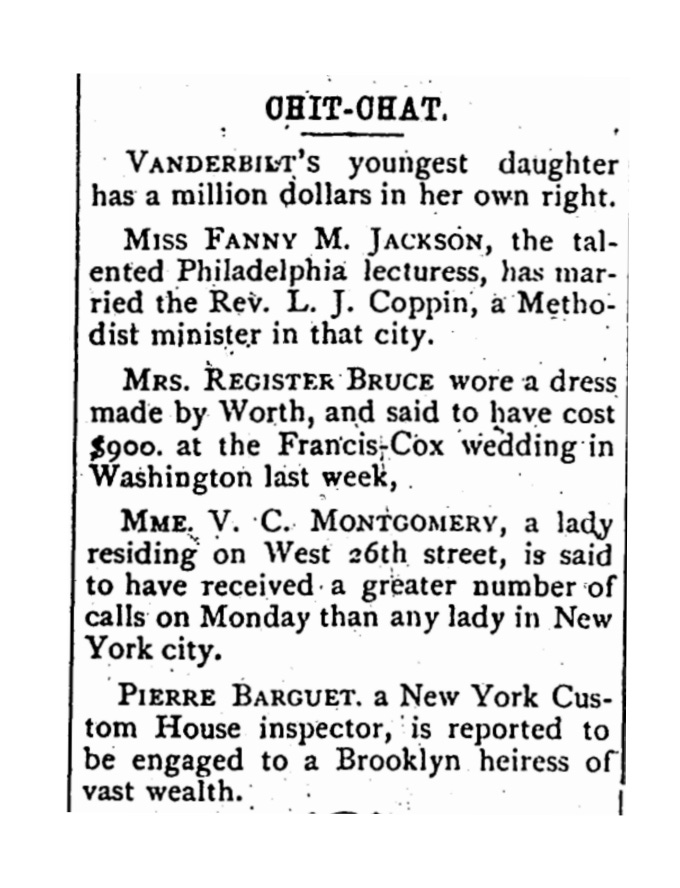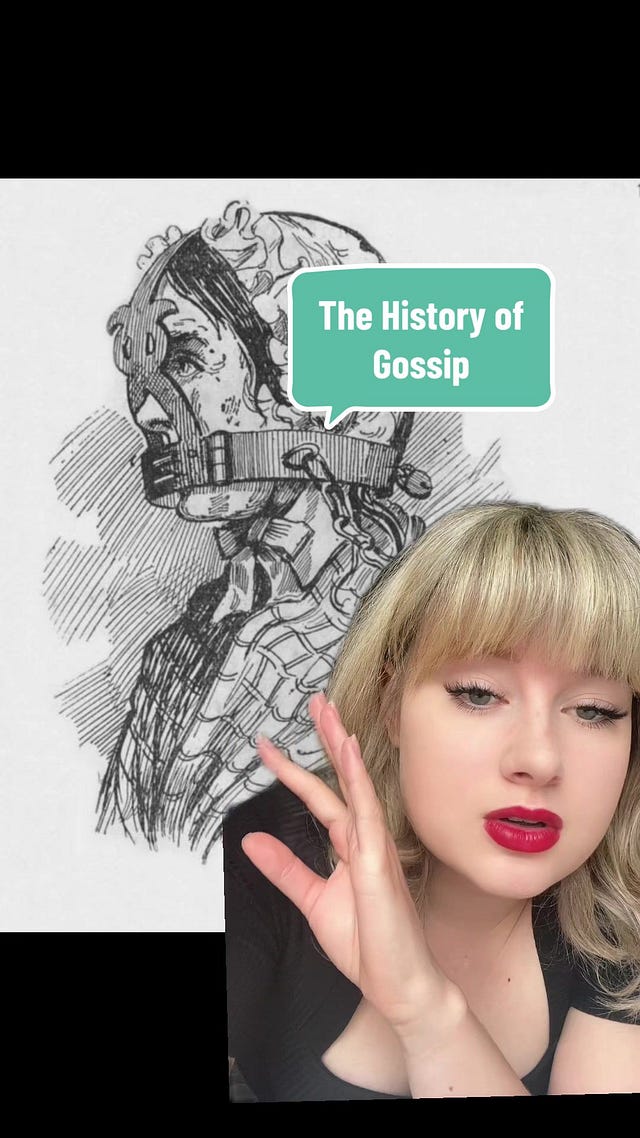The Evolution of Gossip: A Mini-Syllabus on Its Origins and Cultural Impact
A starter pack for anyone curious about gossip and its history
This is a free post for subscribers of Landline. Consider subscribing to the paid plan to get my weekly email of recommendations and links, a podcast episode, and more! You can also help me spread the word by sharing it with a friend who would love it.
“All of us talk. We gossip. Gossip is information. It forges bonds.”
-- Penelope Featherington, Bridgerton
My recent conversation with Virginia Sole-Smith on season 3 of Bridgerton (if you haven’t listened yet, please do!) and a certain rumor going around the internet about Gwyneth Paltrow’s recent houseguest has me thinking a lot about gossip. What is it? Who is it for? Isn’t history just gossip?
I wanted to provide a syllabus for anyone else curious about the origins of gossip, its evolution over time, and its current role in our world.
First, I love this great definition of gossip from Dani Stomper, Freda S. and J. Chester Johnson Archives Fellow and Consultant, Queens College Special Collections and Archives in a piece reflecting on a queer archive of gossip:
“Gossip” can encompass a range of oral and written traditions designed to share valuable knowledge, build relationships, and protect others through secondhand or unprovable information. Its association with women and queer people is entangled with a process of history-making that delegitimizes the care-work such groups need to survive. “[Gossip] exists as a feminized tool…,” argues Emily Guerrero (2022), “which is in turn routinely undervalued and demonized precisely because of its utility in efforts toward collective safety.”
Now, a brief history . . .
Gossip has its etymological roots in words used to describe early godparents and/or the women who would care for a pregnant mother before giving birth, like a modern-day doula. It evolved into a term used to deride women and their communications with one another, as @thehistorygossip describes here:
With the advent of print, gossip columns became part of early print newspapers and have been with us in media ever since. Unlike Bridgerton, which long disguised the writer’s identity, gossip in the regency period often hid the identity of its subject, not its author. Newspapers on both sides of the Atlantic posted not-so-blind items about people in their community and well-known figures. The Tatler, dating back to the 1800s, reported on elite families and debutantes debuting in society and still reports today on hot topics like who gets to sit in the royal box at Wimbledon. Today, we have a celebrity-obsessed gossip culture that dates back to columnists like Hedda Hopper and Louella Parsons, who competed to share the juiciest details in their columns in the 1930s and 1940s. By the 1970s, we had Page Six, People Magazine, US Weekly, and the tabloids we know today. Millennials like me also lived through the advent of gossip online with the rise of Perez Hilton’s gossip blog and, eventually, the perpetual news cycle of social media.
But gossip is more than reporting on celebrities (although that is worthy of study in itself). It is a means of sharing information, recovering and preserving the histories of people whose lives don’t get recorded in news columns or any official archive, and building and maintaining relationships with people in our lives.
Check out the sources below to learn more about gossip and its history.
Note: this is a limited collection of sources by definition, and I’m always open to suggestions to add to this collection!
Primary-Source Gossip (or, gossip as it was dispensed in different periods straight from the source):
@deuxmoi (current gossip blogger on Instagram)
LaineyGossip (current gossip blog)
Pop Culture Died in 2009 (a tribute Tumblr reposts old posts from this Tumblr celebrating media coverage of celebrities in the 2000s)
The first fan magazine for American film
Hedda Hopper’s columns (1930s)
Hedda was a supporter of the House of Un-American Activities Committee, and once received a valentine from a Hollywood star consisting of a skunk with a note saying “I stink and so do you.” Need I say more?
Confidential Magazine, July, 1954.
Celebrities frequently sued this magazine for publishing their secrets, obtained via paid informants (or fictionalized by staff to cause a stir). It outed Liberace, Tab Hunter, and other stars and was sued for defamation in the 1950s.
Articles:
On the history of gossip:
“Pulp Nonfiction: A Brief History of Celebrity Magazines” (PRINT)
Julia Kelly “What Did Gossip Culture Look like Before the Internet?” (LitHub)
Would gossip culture ever survive the Queen deciding to now welcome new at a yearly reception? (Spoiler alert: yes).
Emily Zemler. “The History of Gossip Columns” (Shondaland)
Great timeline of the history of gossip in print from the Regency period forward.
Dani Stompor. “This is our Memory”: Animating an Archive of Gossip.” Metropolitan Archivist. January 16, 2024.
Great description of the care work that goes into making an archive of queer gossip at a college campus publicly available while respecting the real considerations for privacy involved. Includes images of archival notes and messages from students to one another.
On Misc. Gossip-Related Topics:
“Gossip in Black Periodicals” (Archival Gossip)

Part of a larger project documenting gossip in the nineteenth century, this site presents mini-exhibits on gossip-related topics. I love this collection of examples of gossip in black periodicals.
Joseph Epstein. “How Gossip Took Over the News” (Salon)
Katrin Horn. “The Public Gossip of Town Topics: The Journal of Society (1885-1937).” European Journal of American Studies.
An interesting examination of how gossip worked in an American magazine in the 1880s.
Allie Jones. “Pop Culture Died in 2009” (Gossip Time)
Great interview with the founder of one of my favorite Tumblrs devoted to preserving the memory of 2000s media culture insanity.
Anne Helen Petersen. “The down and Dirty History of TMZ.” (BuzzFeed)
Nicholas Quah. “Karina Longworth on Celebrity Gossip and You Must Remember This.” (Vulture)
Michael Waters. “What Would You Do If You Knew Everyone on Your Flight? A Century Ago, Travelers Had the Right Answer.” (Slate)
Listen:
“Gossip Girls: Louella Parsons and Hedda Hopper” You Must Remember This (2021)
A great season of an iconic movie history podcast focusing on the feud between Louella and Hedd and the gossip culture of their era.
Banal gossip about people you’ll never meet. Starting during the pandemic, it offers a source of the kind of low-stakes gossip about strangers we often hear while out on errands, in restaurants, or at work.
An examination of our modern influencer-obsessed gossip culture. Very smart and funny)
Watch:
Elaine Lui. “The Sociology of Gossip”
Call Me! (or not!)
I’d love to hear from you! Drop your thoughts in the comments to share with the Landline community, or reply to this email to contact me. You can also find me on Instagram, or email me. I don’t have a dedicated phone line yet (just like in my youth), but maybe someday I’ll achieve Claudia status and get a Landline.
Thanks for reading!
This is a free post for subscribers of Landline. Consider subscribing to the paid plan to get my weekly email of recommendations and links, a podcast episode, and more! You can also help me spread the word by sharing it with a friend who would love it. Thank you for being a friend!








